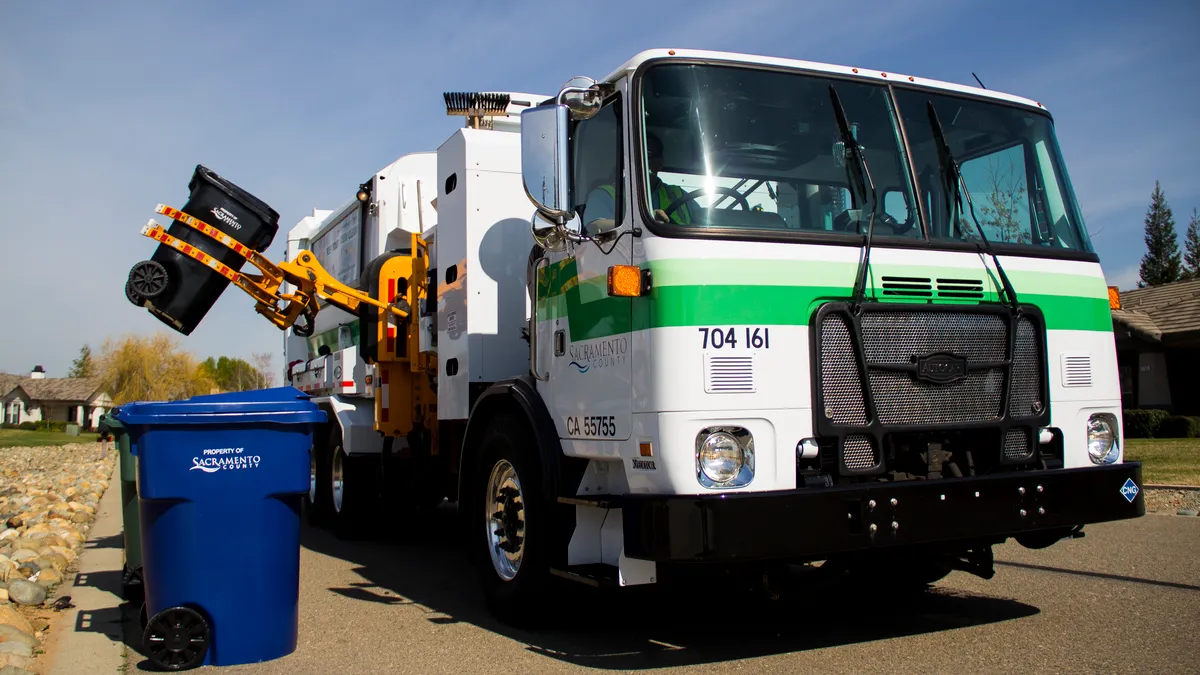Dive Brief:
- California's Sacramento County began testing a new "curbside enhancement program" in two areas this week, after seeing recycling contamination rates so high that loads from certain routes may be taken straight to landfill. About 10,000 households will receive door hangers with guidelines. Half will also receive new blue recycling carts — part of an existing replacement plan — with additional education.
- The county also has plans to do cart inspections during the summer. Doug Kobold, waste program manager, estimates enforcement could cost up to $500,000 and outreach $330,000 for all 150,000 households serviced in the unincorporated area. The initial investment for this pilot will be around $200,000 for the carts (which would eventually be replaced anyway) and an additional $20,000-30,000 on educational materials.
- Now that the county's recycling program has gone from generating $1.2 million in annual revenue to costing at least $1.1 million, Kobold considers this initial funding "money well spent." Sacramento County doesn't have any immediate plans to raise rates, even as its processing costs have risen under new short-term contracts.
Dive Insight:
California's recycling challenges have garnered less attention than others out west, but the state has not been immune to commodity shifts. Last fall, Waste Management paid $250,000 to get out of a county processing contract with a floor price. Recycling Industries was in a similar position, though couldn't afford to buy out of its contract in the same way and ended up working out a settlement in December.
Alex Oseguera, area vice president for Waste Management, said his company's move came after months of discussion and advance notice. He viewed this decision as "the tip of the spear" for what was to come with local officials adjusting to the new market realities. While the company has since resumed taking county material under a new arrangement, Oseguera believes a lot of work remains.
"I think that we're in the middle of a crisis. We are looking for avenues with the different municipalities that we serve to find solutions for that," he said.
Sacramento County is also contracting with local company Cal-Waste Recovery Systems, which could not be reached for comment. The county has a third contract with San Jose-based GreenWaste Recovery, but is currently electing to handle material locally rather than pay transport costs for material that might be rejected for high contamination rates.
Like other local governments, Sacramento County's hope is to strengthen regional processing capacity and domestic markets. Cal-Waste expressed an interest in possibly opening a new local MRF during a Feb. 6 county board hearing, but said a long-term commitment would be needed to put up the necessary capital. State assistance is also seen as a possibility, and a pending bill could deliver $100 million for recycling infrastructure.
Based on moves by other local governments in California and elsewhere, some believe price increases have to be on the table.
"Everyone that I'm talking to is saying that in order to continue to move material, costs are going to have to increase and we’re going to have to come up with a means of passing those costs along to residential and commercial ratepayers," said Mark Murray, executive director of Californians Against Waste.
Murray said Sacramento County's stance is different than the City of Sacramento and others which have been willing to adapt long-term agreements. He believes local governments need to step up their efforts to combat wishful recycling and that the state's recycling rates could be affected in the meantime.
Kobold said the county has sufficient reserves to bear these costs for now and rate increases would be a hard sell among county supervisors or their constituents. Sacramento County is also fairly unique in that it owns and operates a transfer station and landfill with some of the lowest tip fees in the region. Yet per state law, the county can't profit from this site, so raising fees to counteract current recycling costs isn't an option, and curbside rates have historically stayed low.
"I have proclaimed in the past that we are our own worst enemy when it comes to recycling, but we also have no choice because we're a government entity," said Kobold, adding that the environmental benefits are still a top priority. "This is not a simple thing."















